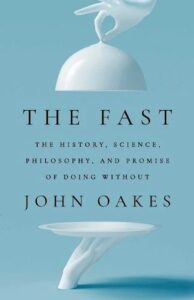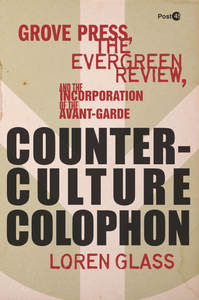John Oakes: The Fast: The History, Science, Philosophy, and Promise of Doing Without
March 2, 2024 by David
Filed under Non-Fiction, WritersCast
 The Fast: The History, Science, Philosophy, and Promise of Doing Without—John Oakes—Avid Reader Press / Simon & Schuster—Hardcover —9781668017418—320 pages—$30—February 13, 2024—ebook versions available at lower prices
The Fast: The History, Science, Philosophy, and Promise of Doing Without—John Oakes—Avid Reader Press / Simon & Schuster—Hardcover —9781668017418—320 pages—$30—February 13, 2024—ebook versions available at lower prices
If you’re expecting to find a “how to guide to fasting” you will have to look elsewhere. John Oakes is far too good a writer and thinker to spend his time writing something simple like a guide book or even a “rah rah” tome aimed at encouraging you to take up the idea of “intermittent fasting” for yourselves. You might decide to try it out after reading The Fast, but that’s not his purpose and not why you should want to read this book. If you are already engaged in fasting, you should read this book. Perhaps it will be most especially useful during the meditative moments while you are in the midst of your own fast.
Oakes is more interested in a deeper approach to this practice, giving it historicity and enabling us to explore for ourselves how denial of a core bodily function can alter consciousness and help us better understand ourselves. This kind of antidote to the habits of modern life does have an appeal to many of us, but even if you are not going to be a practitioner, you will find yourself captivated, as he is, by the science, history, philosophy and spiritual background of fasting and the denial of physical needs. For Oakes, the ideas and the connection to human spirituality are as important as the specific practices themselves. I’m glad of that, as it makes reading this book that much more rewarding to engage with.
I will also note that Oakes, who has been an editor and publisher for many years, is a really terrific writer and therefore you can read this book for the pleasure good writing affords. As I am sure many of you who listen to this podcast have noticed, there are a lot of badly written books out there and no one wants to spend their limited time reading them. Given the vast number of choices of what to read, it is a particular joy to discover a really good writer. Bravo Oakes for spending a lifetime learning how to write, and bravo Avid Reader Press for publishing this book. I hope you will consider reading it yourself after you listen to our conversation here. Whether you decide to fast or not. For myself, much as I like this book, I am happier eating than not, even if it is an indication of my generally shallow approach to spirituality.
I’ve known John Oakes for a number of years through our mutual involvement in independent publishing. He is currently the publisher of The Evergreen Review. He is also editor-at-large for OR Books, which he cofounded in 2009. OR has been a singularly contrarian publisher for many years, built to demonstrate an alternative approach to traditional reliance on a certain popular online bookseller. Oakes has written for a variety of publications and The Fast is his first book.
We had alot of fun talking together about John’s book. Enjoy…
Podcast: Play in new window | Download
Loren Glass: Counterculture Colophon
August 5, 2014 by David
Filed under Non-Fiction, WritersCast
 Counterculture Colophon: Grove Press, the Evergreen Review, and the Incorporation of the Avant-Garde (Post*45) – 978-0804784160 – Stanford University Press – Hardcover – $27.95 (ebook versions available at substantially lower prices)
Counterculture Colophon: Grove Press, the Evergreen Review, and the Incorporation of the Avant-Garde (Post*45) – 978-0804784160 – Stanford University Press – Hardcover – $27.95 (ebook versions available at substantially lower prices)
This book has turned out to be one of the most influential on my recent thinking about publishing and how it should work, proving that history can tell us a great deal about both the present and the future. Grove Press was immensely influential in changing American culture from the 1950s through the 1980s, and remains meaningful today, with its massive backlist representing the golden age of the literary avant-garde of that time. Its longtime owner and spiritual leader, Barney Rosset, has been an almost mythic hero to many who got into publishing because of what he accomplished with Evergreen Magazine and Grove Press. How a publisher could become so powerfully influential makes for a terrific and inspiring story.
Grove’s accomplishments and innovations are legion and well documented by Loren Glass in this book. While Counterculture Colophon is written as an academic history, and sometimes Glass falls prey to academic terminology that may put off the non-scholarly readers, I was happy to overlook the academic jargon and focus on the compelling story he tells of Grove and what it has meant for modern publishing.
This heroic and sometimes tragic saga reminds us of what it means to be a passionate and committed publisher. It’s difficult for anyone alive today to believe that up until the 1960s it was illegal to publish and sell literary books that included sexually explicit content. Battles were fought – and finally won at great expense – by Grove Press against the US government and many local jurisdictions over DH Lawrence’s Lady Chatterley’s Lover, Henry Miller’s Tropic of Cancer and William Burroughs’ notorious Naked Lunch. These cases literally led to “the end of obscenity” and created the groundwork that has enabled modern literary publishing to flourish in our time.
Rosset and Grove, together with myriad editors and publishers in Paris, London, San Francisco, and New York, were at the heart of a revolution in publishing, both in content and in form that in many ways inspired and led directly to an equivalent revolution in the overall American culture, that reverberates today. Grove was at the heart of political, cultural and literary ferment in North America, introducing new voices not only from here, but from around the world, to American readers. Rosset more or less invented the trade paperback, and was a leader in introducing trade books to be used as supplemental reading for college courses, of course hitting its stride at the very moment that the Baby Boom generation went to college. The magazine and press brought an emerging set of writers to an emerging generation of readers, inspiring and changing the way millions read and thought about writing, politics, theater and art. Grove Press was as much a cultural institution as it was a publisher.
And, importantly, what this book most strongly highlighted for me is the meaning and power of a publisher’s brand. It is widely accepted that most publishers today have no identity with readers. Grove Press and its house literary journal, the Evergreen Review, were made into powerful and coherent brands that recognized the publisher as enabled it to introduce formerly unknown writers and artists to their audiences. Using graphics, typography and a consistently subversive publishing program, Grove was able to become a recognized brand for readers, the power of which, seemingly very few publishers have understood or been able to duplicate.
Counter Culture Colophon is a book I strongly recommend to anyone interested in contemporary literature and of course, publishing. Loren Glass was able to interview Rosset and many other principle players in the story of the press. And for many, it will be a truly inspiring tale.
Loren Glass is a Professor of English at the University of Iowa. There is a really nice video of Glass speaking about Rosset and Grove at the Chicago Humanities Festival here. (55 minutes)
Podcast: Play in new window | Download

